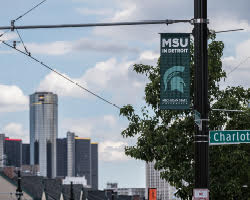Detroit, Lansing, Flint, and Beyond: The Fundamental Role of Working with Cities

Michigan State University has long had a presence in Detroit, the state's largest city.
- Louise Jezierski, Ph.D.
- Associate Professor, Social Relations and Policy
- James Madison College
Louise Jezierski is an associate professor of social relations and policy who integrates theories and methodologies with meaningful experiences that engage students in contemporary challenges.
Cities such as Detroit, Lansing, and Flint in Michigan offer nearby opportunities for Jezierski's students to experience the realities that exist for people living and working in urban and suburban landscapes.
"The Metropolitan Society course (MC 384) that I teach explores the fundamental role of cities. How do they advance democracy, economic growth, and community development? We focus on the rise, decline, and redevelopment of Detroit, and comparative cases such as New York, Chicago, and Los Angeles," said Jezierski.
Beginning with topics about urban decline and suburban sprawl, the students go on to learn demographic and economic measurement techniques utilizing sources such as U.S. census data. That provides context and understanding about urban change, and how it is gauged.
Enhancing the Student Experience
The community-engaged teaching that Jezierski incorporates in her coursework includes opportunities for students to meet and collaborate with community members and policymakers who live and work in cities.
Jezierski wants students to become better acquainted with at least three of the most important Michigan cities.
"Lansing because they live and work here while they are at MSU, and Detroit because of its size, economic impact, and significant history," said Jezierski. "And, obviously Flint, because of its history and recent experiences."
Jezierski focuses on demographic and economic census analysis, qualitative analysis using ethnography, and, spatial-cultural analysis. These are skills that she builds into the coursework, with the expectation that students develop the ability to explore a specific case for further research that can then be incorporated into a portfolio at graduation.
"When I take them to Detroit, I want to both dispel myths and, at the same time, show them what is really happening," said Jezierski.
Viewing the neighborhoods and joining in conversations with community partners provide clear examples of the extent of blight faced by some residents and business operators. "But they also become aware of initiatives that demonstrate the efforts being made by people. Small things make life rewarding," said Jezierski. "They see the opportunity, but it's a difficult bridge to cross."
The Brightmoor Neighborhood in Detroit
John O'Brien has lived in a Detroit neighborhood for 35 years. He is the executive director of the Brightmoor Neighborhood Development, and has been active in the community in a variety of ways.
The Brightmoor area is a four-square-mile area in northwest Detroit. The Northwest Detroit Neighborhood Development (NDND), a 501(c)3 nonprofit, estimates that approximately 40 percent of its housing is affected by arson, abandonment, and neglect. Home values vary from street to street and block to block. Less than half of the homes are owner-occupied, disinterested landlords maintain sub-standard rental properties, residents' income levels are low, and there is a large proportion of single parent families living in the neighborhood.
NDND was established in 1989 by area participants who are dedicated to neighborhood planning and revitalization.
"Networking is important. There needs to be a component that creates a critical mass of people who are committed and willing to provide expertise."
Louise Jezierski
"We want community leadership to be involved in rebuilding Brightmoor, but we also need to work with others to get that done," said O'Brien.
The organization has partnered with universities and private developers for data and assessment studies, economic development plans, and various revitalization efforts.
O'Brien works with Jezierski and her students, and enjoys familiarizing students with the issues. "We talk about clean-up, vacant land, home ownership, rental properties, how to finance projects, green spaces and beautification, and how to keep it all going," he said.
"Louise has been a phenomenal person to work with," said O'Brien. "The students bring ideas, conduct surveys in a knowledgeable way, and give us energy. She really gets them thinking about how this got to where it is, and how it can be as we go forward."
He also has a personal story about Jezierski. "My son and daughter both took classes from her when they were at MSU. My son is now a math specialist in a Detroit school and my daughter is a community organizer in Miami. My daughter is experiencing some of the same urban issues in that city, and based on what she learned at MSU, she is reaching out to Florida universities for expertise. She keeps in contact with Louise, and there may be some other ways to partner with the Miami-Detroit and Florida-MSU connections."
Multiple Partnerships
In addition to Detroit partners, Jezierski has worked with the Saginaw Oakland Commercial Association, a non-profit organization that revitalizes business, residential, and public areas in Lansing.
"Students were involved in these collaborative efforts for more than a year. One lesson they learned is that they rarely get to see a finished product, the work is always evolving," said Jezierski.
While much of Jezierski's research includes revitalization of declining cities−particularly in Detroit, Pittsburgh, and Cleveland−she also specializes in social inequality and social justice, public private partnerships, and local and regional economic and community development. Jezierski's strong commitment to enhancing the student experience has resulted in multiple awards for outstanding undergraduate teaching, as well as curricular service-learning and civic engagement.
"I bring students into these cities and engage them in socially-significant civic activities. We talk about how class, racial, ethnic, gender, and immigration dynamics are played out within metropolitan areas, including urban decline and suburban sprawl. It gives them perspective."
"Networking is important. There needs to be a component that creates a critical mass of people who are committed and willing to provide expertise," said Jezierski.
- Written by Carla Hills, University Outreach and Engagement
- Photograph courtesy of MSU Communications and Brand Strategy